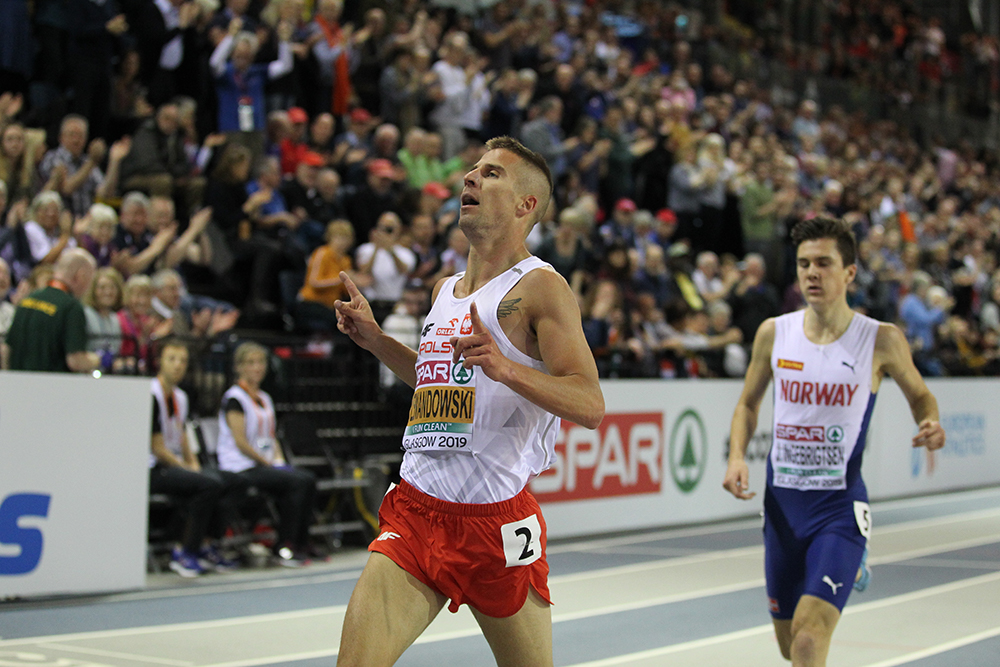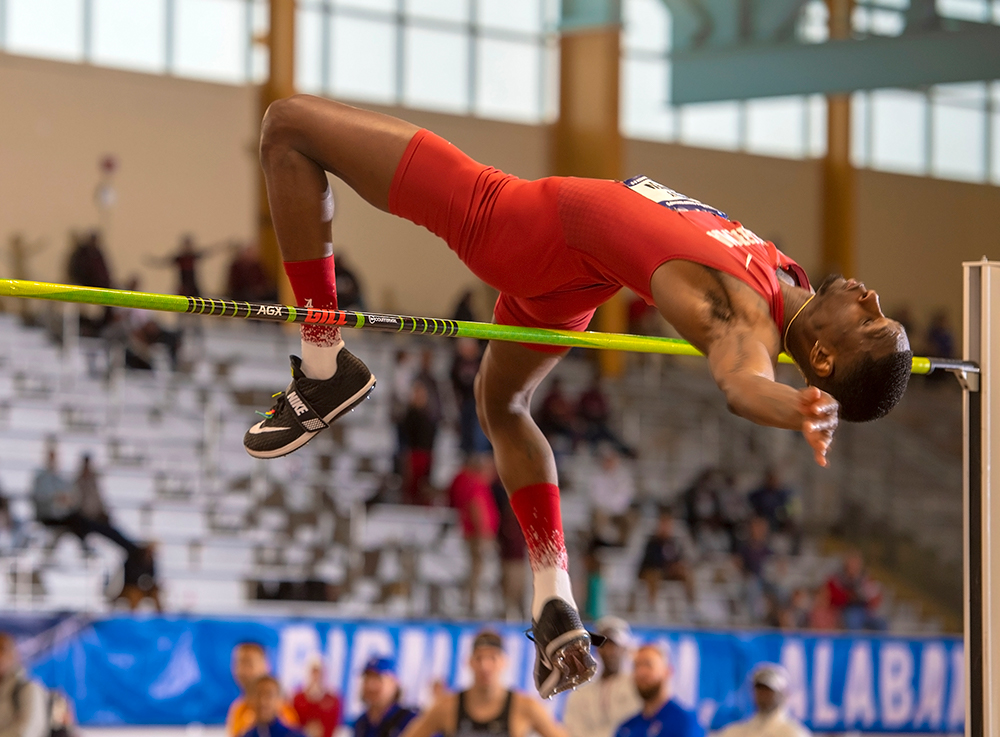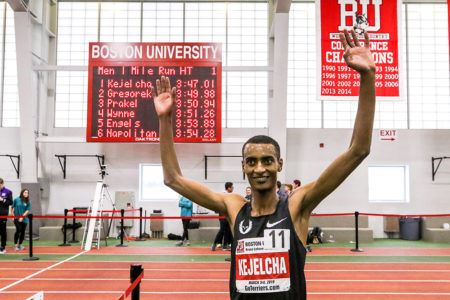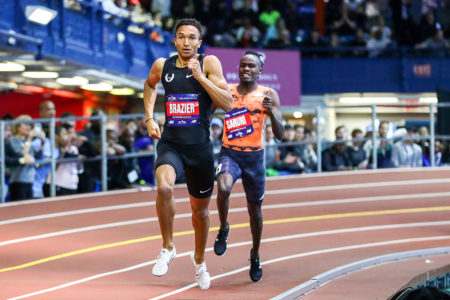
AFTER HIS EURO INDOOR 400 win, Karsten Warholm donned full Scottish regalia, including a kilt. “I am not Scottish, I am from Norway,” he said. “But,” he added, in a nod to his Viking ancestry, “my family was here a thousand years ago.”
“I didn’t shock them because I’m not talented. I shocked them because I’m not from a big school and it’s not well known,” says Tyrell Richards of South Carolina State about his unlooked-for NCAA 400 win. He wasn’t always 100% focused on track, he explains. “I already had an internship going into the championships. I didn’t practice much. I had class conflicts Mondays, Wednesdays and Fridays… I was just iffy about it. I already had a job lined up, making some money and after that came back to school and I’m getting all this hype about me saying I can be really big. So this year I decided to take it fully seriously.”
Until we see the debut of a World Steeplechase Majors circuit, expect to see more water & barrier adepts opting for the more rewarding marathon. Ezekiel Kemboi, 2-time Olympic gold winner at the steeple, will be trying his first marathon in Hamburg in April. Says the 36-year-old Kemboi, who announced his track retirement in ‘17—and then ran a few steeples in ‘18, “I started training last year, my body is fit for the marathon and my timing is equally good.” Fellow Kenyan (and a 2-time world champ himself) Brimin Kipruto, 33, has also announced a move to the long run, with an April debut in Linz.
Samantha Noennig says that her win in the NCAA shot has a lot to do with her training partner, former Arizona State star Maggie Ewen: “I’ve learned so much from her. I really look up to her, too, so to be able to compete the way she does and be clutch the way she is, it feels great.”
Miami’s NCAA pentathlon winner, Michelle Atherley, says that “technically” she has dual citizenship with Belize, and might consider that route to the ‘20 Olympics. “I like to think I’m a realistic person, so I guess I can start with it being a dream. Tokyo would be amazing.”
With her 5000 victory Alicia Monson became the first Wisconsin woman to win an NCAA title in more than 20 years. For the Badger junior, the race was a waiting game: “I try to be kind of reactive. I know that a lot of times that if women take it out early, them doing the work kind of wastes energy. My coaches and I kept in touch and stayed relaxed. I knew I should wait until the end to go, but I wasn’t really sure when, but when I did decide to go I knew that was the time to take it.”
Tim Duckworth, the NCAA decathlon champ last year for Kentucky, was raised in the U.S. but competes for Britain. In the Euro heptathlon, he held on to the silver spot with a timely PR in the event, a 6.79 improvement. “I needed a PB and I knew I could do it in the 1000,” he said. “So that was the main goal going into it—just run as fast as I can, for as long as I could. There were lots of ups and downs. That’s for sure. It started out well, took a dip with shot put, came back up with the high jump, then at the beginning of today kind of went back down but I finished strong. I’ve been dreaming about that feeling of winning a medal for a while.”
One of the unlikeliest winners in Birmingham was Northern Arizona’s Geordie Beamish in the mile. The New Zealander got into the meet with a 4:06.96 PR on the high-altitude, oversized oval at Flagstaff. Outdoors, he has a 1500 best of just 3:41.87. Said Beamish, “It was a super emotional race. What was crucial for me was staying calm and keeping my emotions low early in the race. I knew I had to keep myself relaxed especially because I was boxed in for 90 percent of that race.” Added Lumberjack coach Michael Smith, “His feel for when to move has been so spot-on this season.”
The Texas Tech program that has produced NCAA men’s high jump champions in JaCorian Duffield and Trey Culver, and runner-up finishes for Bradley Adkins, now has a women’s star in Zarriea Willis. Says jumps coach James Thomas, “Just to see her progress over these last 4 years and come back to win a national title her senior year is special. I’ve been tough on Zarriea for 4 years. I’ve really tried to push her to do some things she didn’t think she could do, and she took it like a champ. I’ve coached her unlike a lot of athletes I’ve had and she’s turned into one of the most consistent high jumpers in the country.”
Bryce Hoppel of Kansas shocked many with his big kick to win the NCAA 800. He said of being the favorite going into the outdoor season, “Apparently I’m undefeated right now. I’ll just keep trying to go with that.”

Alabama’s Shelby McEwen was a 7-¾ (2.15) jumper in high school in Oxford, Mississippi. Those hops made him a state champion. But he signed to play basketball at a JC that didn’t have a track program. Jumping unattached in those years, he climbed up to 7-3¾ (2.23). Crimson Tide coach Dan Waters saw him at one of his few meets and was sold: “I went to coach [Miguel] Pate and said, ‘Let’s make sure we offer that guy a scholarship.’ Within about 3–4 days, we had him signed and committed to come over here.” McEwen says his 7-year-old niece helped him win the NCAA title: “On my last jump, the crowd got real quiet. I could hear my niece. She said, ‘Let’s go, Shelby.’ So she kind of put a spark in me. So when I rocked back and I approached it, I was like, ‘Oh yeah, I got it.’”
Euro triple jump champ Ana Peleteiro of Spain (nickname: “The Kangaroo Girl”) says her success has everything to do with her coach, Iván Pedroso, many times a world LJ gold medalist for Cuba. “He brings everything, but the most important thing is the craziness. He was so crazy when he was an athlete and he would always say ‘come on, come on.’ But he is a very good person. I want to be like him, but I know it is so difficult. I am working to that, I know I can do it and I know we are in the beginning of my runway and I know I have to train more and dream bigger but I am happy now.”
After several years struggling with injury, Italian high jumper Gianmarco Tamberi could not have been happier with his Euro Indoor gold. “I want to drink a beer,” he said. “I want to go out and I want to celebrate. Now I am happy. I can jump again. I want to enjoy this moment. Over the last two years, there have been many times when I have cried because of my failure and being frustrated because I wanted it so much. The people around me wanted to support me but I never wanted them to say ‘You are doing good, you are OK jumping 2.20 [7-2½]’. I did not want to be satisfied with 2.20.”
When Milan Trajkovic of Cyprus—in lane 1—won the Euro Indoor hurdles by 0.01 over outdoor champ Pascal Martinot-Lagarde, he didn’t believe it at first: “I hit two barriers very, very hard when I was running, and I took a tiny look to my right while finishing and there were just too many bodies around, so I lay on the ground annoyed at myself. And then I saw my name on the board and thought ‘Oh, cool!´ ”
Kara Goucher says she is moving to trail racing, with her first event scheduled to be the Leadville Trail Marathon in June. She told Runner’s World, “I grew up getting lost in the forest and coming back muddy and dirty. That’s when I fell in love with running… I still want to run hard. I like the way that feels.” She does not rule out returning to the roads in the future.
Katarina Johnson-Thompson won the Euro pentathlon with a 4980 score, just 30 points shy of the World Record. “It’s very high-level stuff when you’re going for a big score,” she said. “You can’t afford any mistakes but that’s sport. But 4980 is still a big score so I’m proud of myself and the score. I’ve learned a lot from [the ’15 edition] where I didn’t get to enjoy that moment and that was a bigger score so I’m just going to enjoy this one.”
Poland took 1-2 in a marathon vault competition at Glasgow, led by Paweł Wojciechowski, who said, “I don’t remember a competition, in which I had as many as 15 jumps. I would never expect what happened in Glasgow. I crossed my limit there, which is about 8 jumps. It was a tough competition, after a hard qualifying, and I forgot my shirts somewhere along the way. However, I would not be myself if something like that didn’t happen.”
When Jasmyn Steels of Northwestern Louisiana won the NCAA long jump, she was shocked, but not by the distance. “In the back of my mind I knew that 6.46m [21-2½] would win it, but I didn’t know I was going to go hit that mark. I always had the number in mind, so it was really weird.”
Chris O’Hare, who won silver in the Euro Indoor 3000 behind Norway’s Henrik Ingebrigtsen, defended the victor, who like his brothers is reputed to have extraordinary self-esteem. “I’ve known Henrik for years now. They can sometimes get a bit of a bad name for being overconfident but they back it up all the time. As an athlete, you respect that, you hope they don’t back it up but they always do.” □






